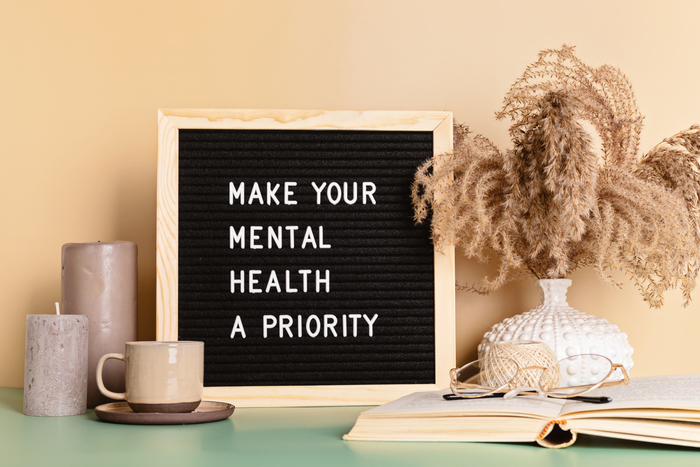Mental health encompasses our emotional, psychological, and social well-being, influencing how we think, feel, and act, according to the CDC. They explain that it plays a crucial role in determining how we handle stress, relate to others, and make choices. This article delves into the significance of mental health and underscores the consensus among specialists that many mental health conditions have physical roots. By exploring the intricate connections between the mind and body, we aim to shed light on the importance of addressing mental health issues comprehensively, recognizing that both psychological and physiological factors play a pivotal role in overall well-being.
Mental Health Definition
Understanding mental health is fundamental to appreciating its impact on our lives, according to the National Alliance on Mental Illness (NAMI). The World Health Organization explains that mental health refers to a state of well-being in which an individual realizes their own potential, can cope with the normal stresses of life, can work productively, and is able to make a contribution to their community. It is not merely the absence of mental illness but encompasses a spectrum of emotional, psychological, and social factors that contribute to overall mental wellness. Good mental health allows individuals to navigate their lives with resilience, maintain fulfilling relationships, and adapt to change and adversity.
Several factors influence mental health, according to the CDC — including genetics, brain chemistry, life experiences, and family history of mental health problems. Biological aspects such as neurotransmitter imbalances and hormonal fluctuations can significantly impact mental health. Additionally, social and environmental factors, such as exposure to trauma, chronic stress, and socio-economic conditions, play a crucial role. Thus, mental health is a complex interplay of various elements, necessitating a holistic approach to understanding and fostering it.
Why Is Mental Health Important?
Recognizing the importance of mental health is essential for leading a balanced and fulfilling life, according to the CDC. They note that by understanding the significance of mental well-being, we can better appreciate the need for mental health awareness and proactive care.
Mental health is vital because it affects every facet of our lives, from our emotional state and relationships to our physical health and productivity. Good mental health enables individuals to manage stress effectively, make sound decisions, and maintain positive relationships. It fosters resilience, allowing people to bounce back from life's challenges and setbacks. According to the CDC, when mental health is compromised, it can lead to a range of issues, including anxiety, depression, and other mental health disorders, which can significantly impair one's quality of life.
Moreover, mental health is closely linked to physical health, according to the CDC. They explain that poor mental health can contribute to or exacerbate physical health problems such as heart disease, diabetes, and chronic pain. Conversely, maintaining good mental health can enhance physical well-being, improve immune function, and promote longevity. Therefore, prioritizing mental health is not only crucial for emotional and psychological well-being but also for overall health and longevity. By fostering a supportive environment and seeking appropriate care when needed, we can ensure that mental health receives the attention it deserves, ultimately leading to healthier, more fulfilling lives.
What Is Mental Illness?
Mental illness refers to a wide range of mental health conditions that affect mood, thinking, and behavior, according to NAMI. They explain that these conditions can vary in severity and duration, impacting an individual's ability to function in daily life. Common types of mental illnesses include anxiety disorders, mood disorders such as depression and bipolar disorder, psychotic disorders like schizophrenia, and personality disorders. Mental illnesses are medical conditions that require diagnosis and treatment, just like physical illnesses, according to the CDC.
The causes of mental illness are complex and multifaceted, according to the CDC. They explain that the cause of mental illness often involves a combination of genetic, biological, environmental, and psychological factors. For instance, a family history of mental health issues, brain chemistry imbalances, traumatic life experiences, and chronic stress can all contribute to the development of mental illnesses. Understanding these factors is crucial for effective diagnosis and treatment, as it allows for a more comprehensive approach to managing these conditions.
Living with a mental illness can be challenging, but with proper support and treatment, individuals can lead fulfilling lives, according to NAMI. They note that treatments may include medication, psychotherapy, lifestyle changes, and support from family and friends. Early intervention and ongoing care are key to managing symptoms and improving quality of life. By increasing awareness and reducing stigma around mental illness, we can create a more supportive environment for those affected, encouraging them to seek the help they need.
Types of Mental Health Disorders
Mental health disorders encompass a wide range of conditions that affect an individual's emotional, psychological, and social well-being, according to the CDC. They note that by familiarizing ourselves with these disorders, we can better understand the challenges faced by those affected and the importance of seeking appropriate care and support.
Some types of mental health disorders, according to NAMI, include:
-
Anxiety Disorders: Conditions characterized by excessive fear or anxiety, such as generalized anxiety disorder, panic disorder, and social anxiety disorder.
-
Mood Disorders: Disorders that primarily affect a person's emotional state, including depression and bipolar disorder.
-
Disruptive Behavior Disorders: Conditions involving behavioral issues, such as attention-deficit/hyperactivity disorder (ADHD) and oppositional defiant disorder (ODD).
-
Eating Disorders: Disorders related to unhealthy eating behaviors, such as anorexia nervosa, bulimia nervosa, and binge-eating disorder.
-
Post-Traumatic Stress Disorder (PTSD): A condition triggered by experiencing or witnessing a traumatic event, leading to severe anxiety, flashbacks, and other symptoms.
-
Personality Disorders: Disorders characterized by enduring patterns of behavior, cognition, and inner experience, such as borderline personality disorder and antisocial personality disorder.
-
Substance Use Disorders: Conditions involving the misuse of alcohol, drugs, or other substances, leading to significant impairment or distress.
-
Obsessive-Compulsive Disorder (OCD): A condition marked by unwanted, persistent thoughts (obsessions) and repetitive behaviors (compulsions).
-
Schizophrenia and Other Psychotic Disorders: Disorders characterized by distorted thinking and perception, including hallucinations and delusions.
Symptoms of Mental Health Disorders
Recognizing the symptoms of mental health disorders is crucial for early intervention and effective treatment. This section outlines a range of common symptoms associated with various mental health conditions. By identifying these signs, individuals and their loved ones can seek appropriate help, fostering better outcomes and improved well-being.
Some symptoms of declining mental health, according to NAMI, include:
-
Feeling blue or low: Persistent sadness or a feeling of emptiness.
-
Disoriented thoughts, mental fog: Difficulty concentrating or making decisions.
-
Overwhelming worry or deep remorse: Excessive anxiety or guilt that is hard to control.
-
Erratic mood swings: Rapid and extreme changes in mood.
-
Social isolation: Withdrawal from friends, family, and social activities.
-
Chronic fatigue, insomnia: Persistent tiredness or difficulty sleeping.
-
Delusional behavior, seeing or hearing things that aren’t there: Experiencing hallucinations or delusions.
-
Difficulty managing stress: Inability to cope with everyday stressors.
-
Substance abuse issues: Increased use of alcohol, drugs, or other substances.
-
A significant shift in diet: Noticeable changes in eating habits, such as overeating or loss of appetite.
-
Aggressive behavior, violent tendencies: Uncharacteristic anger or hostility.
-
Suicidal thoughts: Thinking about or planning self-harm or suicide.
-
Loss of interest in activities: Diminished interest or pleasure in activities once enjoyed.
-
Physical symptoms without a clear cause: Unexplained aches, pains, or digestive issues.
Causes of Mental Health Disorders
Understanding the causes of mental health disorders is key to developing effective prevention and treatment strategies. This section explores some of the primary factors that contribute to the development of mental health conditions. By examining these causes, we can gain a deeper insight into the complexity of mental health and the necessity for a multifaceted approach to care, according to the CDC.
Some causes of mental health disorders, according to the CDC, include:
-
Inherited Characteristics: Genetics plays a significant role in mental health. Individuals with a family history of mental health disorders are more likely to develop similar conditions. This genetic predisposition can increase the risk of disorders such as depression, bipolar disorder, and schizophrenia.
-
Environmental Factors: The environment in which a person lives can greatly influence their mental health. Exposure to traumatic events, chronic stress, and adverse childhood experiences can lead to the development of mental health disorders. Additionally, socioeconomic factors, such as poverty and lack of access to healthcare, can exacerbate these conditions.
-
Biological Factors: Imbalances in brain chemistry and hormonal fluctuations can contribute to mental health disorders. For instance, neurotransmitter imbalances are often linked to conditions like depression and anxiety. Other biological factors, such as prenatal exposure to toxins or infections, can also increase the risk of developing mental health issues.
Risk Factors of Mental Health Disorders
Identifying the risk factors associated with mental health disorders is crucial for prevention and early intervention, according to NAMI. They explain that by understanding these risk factors, individuals and healthcare providers can take proactive steps to mitigate their impact and promote better mental health outcomes.
Some risk factors for mental health disorders, according to the CDC and NAMI, inclulde:
-
Socioeconomic Stress: Financial instability, unemployment, and living in poverty can contribute to chronic stress and anxiety, increasing the risk of mental health disorders.
-
Childhood Trauma: Experiencing abuse, neglect, or other traumatic events during childhood can have long-lasting effects on mental health, leading to conditions such as PTSD, depression, and anxiety.
-
Family's Biological History: A family history of mental health disorders can predispose individuals to similar conditions due to genetic factors.
-
Having a Current Medical Condition: Chronic illnesses or severe medical conditions can contribute to mental health issues, such as depression and anxiety, due to ongoing physical pain, stress, and lifestyle changes.
-
Traumatic Experiences: Experiencing or witnessing traumatic events, such as violence, accidents, or natural disasters, can lead to the development of mental health disorders like PTSD.
-
A Previous Mental Illness: Having a history of mental health disorders can increase the risk of recurrence or the development of additional mental health issues.
-
Loneliness: Social isolation and a lack of supportive relationships can contribute to feelings of depression and anxiety, exacerbating mental health problems.
-
Substance Abuse: The misuse of alcohol, drugs, or other substances can both result from and contribute to mental health disorders, creating a cycle of dependency and worsening symptoms.
-
High-Stress Occupations: Jobs that involve high levels of stress, such as first responders, military personnel, and healthcare workers, can increase the risk of developing mental health disorders due to the demands and pressures of their roles.
Medical Treatment for Mental Wellness
Effective management of mental health disorders often requires a combination of medical treatments tailored to an individual's specific needs, according to NAMI. By exploring these options, we can better understand the diverse approaches available to support mental health and improve overall quality of life.
Some of the most common treatments for mental wellness, according to NAMI, include:
-
Psychotherapy: Also known as talk therapy, psychotherapy involves working with a mental health professional to address emotional and psychological issues. Techniques such as cognitive-behavioral therapy (CBT) and dialectical behavior therapy (DBT) help individuals understand and change negative thought patterns and behaviors.
-
Other Talking Therapies: Beyond traditional psychotherapy, other forms of talking therapies, such as group therapy and family therapy, provide additional support. These therapies offer a platform for individuals to share experiences and gain insights from others facing similar challenges, fostering a sense of community and understanding.
-
Medication: Medications, such as antidepressants, antianxiety drugs, and mood stabilizers, can be prescribed to manage symptoms of mental health disorders. These medications work by balancing chemicals in the brain, helping to alleviate symptoms and improve mental functioning.
-
Electroconvulsive Therapy (ECT): For severe cases of mental health disorders that do not respond to other treatments, ECT may be an option. This procedure involves sending small electric currents through the brain to trigger a brief seizure, which can help reset brain chemistry and alleviate severe symptoms of conditions like depression and bipolar disorder.
How to Improve Mental Health With Self-Care
Self-care is an essential component of maintaining and improving mental health, according to NAMI. They explain that by adopting these self-care strategies, individuals can enhance their resilience, reduce stress, and promote overall mental wellness.
Some tips for mental health self-care, according to NAMI, include:
-
Healthy Eating: Consuming a balanced diet rich in fruits, vegetables, whole grains, and lean proteins can have a positive impact on mental health. Nutrient-rich foods support brain function and can help stabilize mood and energy levels.
-
Regular Exercising: Engaging in physical activity releases endorphins, which are natural mood lifters. Regular exercise, such as walking, running, or yoga, can reduce symptoms of anxiety and depression and improve overall mental well-being.
-
Improve Sleeping Habits: Quality sleep is crucial for mental health. Establishing a regular sleep schedule, creating a restful environment, and avoiding screens before bedtime can improve sleep quality and, in turn, enhance mental health.
-
Consider Trying Mindfulness and Meditation: Practices like mindfulness and meditation can help reduce stress and increase awareness of the present moment. These techniques promote relaxation and can improve emotional regulation, making it easier to cope with daily challenges.
-
Work on Meaningful Relationships: Building and maintaining strong, supportive relationships can provide emotional support and a sense of belonging. Investing time in meaningful connections with family, friends, and community can significantly boost mental health.
-
Set Realistic Goals: Setting achievable goals and breaking them down into manageable steps can provide a sense of purpose and accomplishment. This practice can help reduce feelings of overwhelm and increase motivation and self-esteem.
When to See a Doctor for Mental Health Issues
Recognizing when to seek professional help for mental health issues is crucial for timely and effective intervention, according to the CDC. They note that by understanding these indicators can help individuals take proactive steps toward improving their mental health and accessing the support they need.
The CDC explains that it's important to see a doctor if you experience persistent symptoms that interfere with your daily life, such as ongoing sadness, anxiety, or mood swings that don't seem to improve with self-care or support from loved ones. Other signs include significant changes in sleep patterns, appetite, or energy levels, and difficulty managing stress or performing daily tasks. If you notice that your mental health is affecting your relationships, work, or overall quality of life, it's time to seek professional help. Additionally, if you have a history of mental health disorders and notice a recurrence of symptoms, early intervention can prevent the condition from worsening.
If you or someone you know is experiencing suicidal thoughts or behaviors, it is critical to seek immediate assistance. Suicidal ideation is a medical emergency that requires prompt attention. Contact a mental health professional, call a crisis hotline, or go to the nearest emergency room for urgent care. In the United States, the National Suicide Prevention Lifeline is available 24/7 at 1-800-273-8255, providing confidential support for those in crisis. Remember, reaching out for help is a sign of strength, and there are resources available to provide the necessary support and care.











